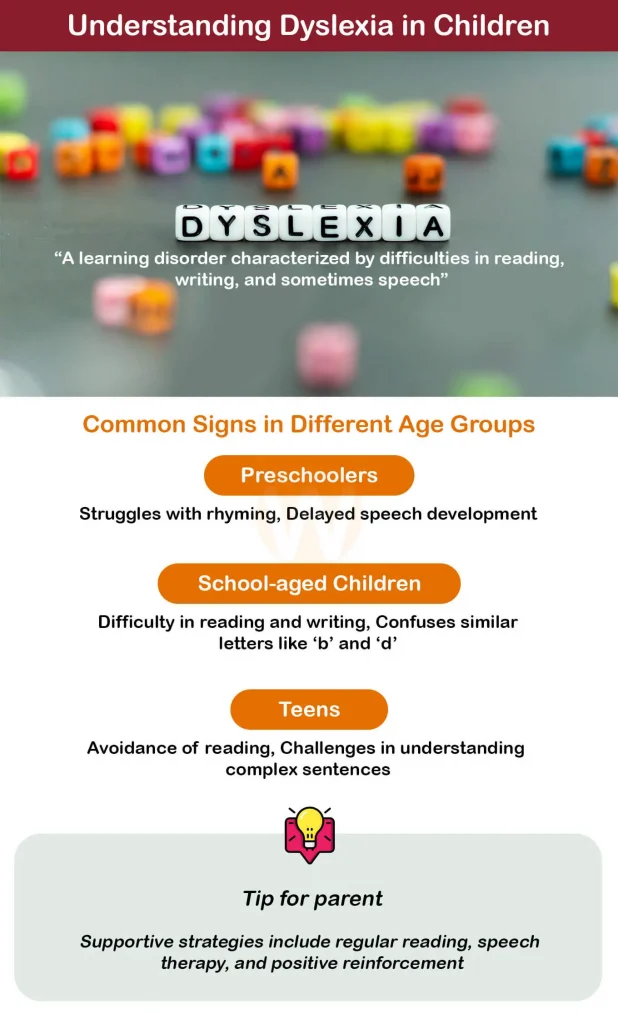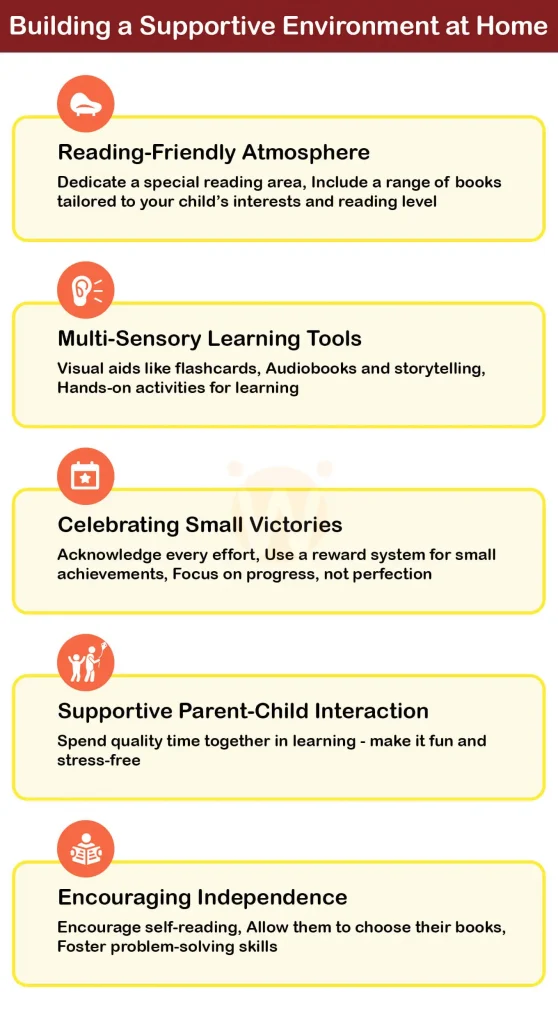Empowering Children with Dyslexia and Speech Difficulties: A Parent’s Guide to Understanding and Support
By Rajini D
Last Updated: January 23, 2024
As parents, we often dream of a smooth and happy learning journey for our children. But what happens when unexpected challenges like dyslexia and speech difficulties arise? Understanding these conditions isn’t just about recognizing the signs; it’s about empowering ourselves as parents to provide the best support and nurturing environment for our children.
Dyslexia, a common learning disability, affects a child’s ability to read, spell, and sometimes speak. It’s not about lacking intelligence or desire to learn; it’s about the brain processing written and spoken language differently. This can make traditional learning paths more challenging, but with the right support, children with dyslexia can flourish.
Similarly, speech difficulties can range from stuttering to trouble pronouncing words or expressing thoughts coherently. These challenges can impact a child’s confidence and social interactions, but, like dyslexia, they can be managed effectively with understanding and support.
Also Read: Is It Speech Delay or Autism? Understanding Your Child’s Communication Development
Understanding Dyslexia and Its Impact on Speech

What is Dyslexia?
Dyslexia is more than just mixing up letters and struggling with spelling. It’s a specific learning disability that primarily affects the ability to read and process language. But did you know that it can also influence speech? It’s like having a unique wiring in the brain that makes decoding words and sounds a bit of a jigsaw puzzle.
Children with dyslexia often have a hard time breaking words into smaller sound units, which is crucial for both reading and speaking. This isn’t about intelligence or effort; it’s about how their brains process language.
For a deeper understanding of how dyslexia impacts the speech chain, read our detailed article The Speech Chain.
Comparison of Dyslexia Signs by Age Group
| Age Group | Preschoolers | School-aged Children | Teens |
|---|---|---|---|
| Delayed Speech Development | May struggle with learning to talk; mixes up phrases or pronounces longer words incorrectly. | Less evident as speech develops, the focus shifts to reading. | Not typically a primary concern; the focus is more on academic challenges. |
| Difficulty in Rhyming | Shows little understanding of rhyming words or difficulty playing rhyming games. | May struggle with phonemic awareness affecting reading and spelling. | Issues may persist in more subtle forms, like word retrieval or wordplay. |
| Reading and Writing Difficulties | May take longer to learn the alphabet or to start reading. | Faces challenges in learning the names and sounds of letters, and frequent spelling mistakes. | Avoidance of reading, underdeveloped reading comprehension, continued spelling errors. |
| Avoidance of Reading | Less noticeable; may not show a clear preference or avoidance yet. | Begins to avoid activities that involve reading due to difficulty. | Often tries to avoid reading and writing tasks and may rely more on verbal skills. |
Also Read: Speech and Language Milestones: 0 to 12 Months
How Dyslexia Affects Speech and Language Development
Imagine a child trying to read a sentence or pronounce a new word. For those with dyslexia, this process is like navigating a labyrinth. They might jumble sounds or find it challenging to articulate longer words. This isn’t just about reading aloud; it’s about how they comprehend and use language daily.
For a preschooler, this might show up as difficulty in rhyming games or mixing up sounds in words. As they grow, school-aged kids might shy away from reading aloud or struggle to follow along in phonics classes. These early signs, often overlooked, are critical indicators of how dyslexia is impacting their speech and overall language development.
The Neurological Basis of Dyslexia and Speech Challenges
Dyslexia isn’t just a surface-level challenge; it’s deeply rooted in neurology. The brain’s language-processing areas work differently in those with dyslexia. It’s less about the words on the page and more about how their brain interprets these words. This difference in neurological processing means they might hear and interpret spoken language uniquely, affecting how they speak and understand others.
Explore our article on language disorders for insights into the neurological aspects and their management.
Recognizing the Signs of Dyslexia and Speech Problems
Early Signs in Preschoolers
Before a child even steps foot in a classroom, there can be early signs of dyslexia and speech difficulties. Maybe your preschooler mixes up sounds in multi-syllabic words or struggles to learn new words. These are like early whispers, hinting at dyslexia.
Symptoms in School-aged Children
As children enter school, the signs become more pronounced. Perhaps you’ve noticed your child avoiding reading activities, getting frustrated with spelling, or having trouble following along in class. These struggles can be mistakenly labeled as a lack of interest or effort, but they’re often signs of underlying dyslexia.
Indicators in Teens and Adults
Dyslexia is a lifelong journey. In teens and adults, it can manifest as a persistent avoidance of reading, reliance on memory over written notes, or difficulties in word recall. It’s not just about academic challenges; it impacts daily communication and self-expression.
The Emotional and Social Impact of Dyslexia
Understanding dyslexia goes beyond its academic challenges; it’s about recognizing the emotional and social hurdles that come with it. For children grappling with dyslexia, each day in school and social settings can be filled with invisible battles, often misunderstood by those around them.
Challenges in Social Settings and School
In the playground or classroom, a child with dyslexia might feel like they’re always a step behind. Group readings turn into moments of anxiety, and seeing their peers excel can be disheartening. It’s not just about reading out loud; it’s about feeling different or excluded. They might struggle to join in games that involve reading or wordplay or feel embarrassed when they can’t spell a word their friends find easy.
The Emotional Toll of Learning Difficulties
The constant effort to keep up can be emotionally exhausting for a child with dyslexia. Feelings of frustration, low self-esteem, and a sense of inadequacy can become daily companions. It’s heartbreaking to see your child describe themselves as ‘stupid’ or ‘dumb’ just because their brain processes language differently. The emotional toll can often be as challenging as the academic hurdles.
Fostering Empathy and Understanding
As parents, teachers, and friends, our role is to create an environment of empathy and understanding. It’s about celebrating the small victories and understanding that progress might look different for a child with dyslexia. We need to listen, offer support, and remind them that dyslexia is just one part of their incredible selves.
In school, teachers can be allies in this journey. By adopting teaching methods that cater to diverse learning needs and fostering an inclusive classroom, we can help ease the emotional weight that these children carry. It’s about teaching peers to be kind and understanding and to see beyond the surface of reading and writing challenges.
At home, parents can create a safe space where children feel understood and accepted. It’s important to acknowledge their efforts, encourage their strengths, and remind them that dyslexia doesn’t define their intelligence or their future.
Diagnosis and Evaluation
Diagnosing Dyslexia and Related Speech Problems
Diagnosing dyslexia, especially in its early stages, can be like piecing together a complex puzzle. It’s not just about a single test or observation; it involves a comprehensive evaluation by professionals like reading specialists or psychologists. This process often includes a review of the child’s reading and writing skills, language development, cognitive abilities, and educational history.
The Importance of Early Detection and Intervention
The early years of a child’s life are critical for language and reading development. Early detection of dyslexia and speech problems is crucial because it paves the way for early intervention, which can significantly improve outcomes. The sooner these challenges are identified, the sooner tailored support can begin. This proactive approach can make a substantial difference in a child’s academic achievements and self-esteem.
Understanding early identification and warning signs in child development can aid in timely diagnosis.
Effective Management Strategies

Educational and Therapeutic Interventions
Once dyslexia or speech difficulties are identified, a range of educational and therapeutic interventions come into play. These can include specialized reading programs that focus on phonemic awareness, phonics, and reading comprehension. Speech therapy can also be instrumental, especially for children who struggle with articulation or expressive language.
Therapies are often personalized, considering the child’s specific needs and learning style. The aim is to develop strategies that help children decode language, enhance reading skills, and improve communication.
Role of Speech Therapy and Specialized Reading Programs
Speech therapy plays a pivotal role in helping children overcome speech-related challenges associated with dyslexia. Speech-language pathologists work on various aspects, such as articulation, fluency, and language processing.
Specialized reading programs, on the other hand, are designed to tackle the unique challenges posed by dyslexia. These programs often adopt multi-sensory teaching techniques to enhance learning, making reading and comprehension more accessible to children with dyslexia.
Also Read: Engaging Home-Based Occupational Therapy Activities for Children with Autism
Tips for Parents to Support Their Children at Home
As a parent, your role in your child’s journey with dyslexia is invaluable. Creating a supportive home environment where reading is encouraged and celebrated can make a significant difference. Here are some tips:
- Encourage Regular Reading: Create a reading-friendly atmosphere at home where your child feels comfortable and motivated to read.
- Use Multi-Sensory Learning Tools: Engage your child in learning activities that involve seeing, hearing, and touching to enhance their learning experience.
- Stay Informed and Involved: Work closely with your child’s educators and therapists. Being informed about their progress and challenges helps in providing better support at home.
- Celebrate Progress: Acknowledge and celebrate every small achievement to boost your child’s confidence.
Effective Strategies for Managing Dyslexia
| Strategy Type | Description | How Parents Can Implement |
|---|---|---|
| Reading Support | Tailored programs focusing on phonics and reading comprehension. | Encourage regular reading sessions at home. Use phonics-based reading materials and engage in interactive reading activities. |
| Speech Therapy | Professional help for addressing speech-related challenges associated with dyslexia. | Collaborate with speech therapists. Practice recommended exercises at home and encourage your child to apply these skills in daily conversations. |
| Multi-Sensory Learning | Engaging various senses (visual, auditory, kinesthetic) for a holistic learning experience. | Introduce educational games and activities that incorporate different senses. This could include visual aids, auditory storytelling, and hands-on learning projects. |
| Positive Reinforcement | Building confidence and self-esteem through encouragement and positive feedback. | Acknowledge and celebrate all efforts, whether big or small. Emphasize strengths and unique talents, and set realistic and achievable goals. |
| Structured Routine | Establishing a consistent and predictable daily schedule to enhance focus and reduce anxiety. | Create a balanced routine that includes specific times for homework, reading, play, and relaxation. Ensure the schedule is flexible enough to accommodate your child’s pace. |
Also Read: Unlocking Communication: Effective Speech Therapy for Autism
Integrating Professional Help and Parental Support
Navigating the challenges of dyslexia and speech difficulties is a journey that requires a team effort. Integrating professional help with parental support is crucial in creating a comprehensive approach to managing these conditions effectively. It’s about blending the expertise of professionals with the nurturing care of parents to provide a balanced and supportive environment for children.
The Role of Professional Help
Professional support comes in various forms – from educational therapists and speech-language pathologists to counselors and special educators. These experts offer targeted strategies and interventions tailored to each child’s needs. For instance, educational therapists can provide specialized reading programs, while speech-language pathologists focus on improving communication skills.
Counseling is another vital aspect, particularly for older children and teenagers who might grapple with self-esteem issues due to their learning challenges. Professional counselors can help them build resilience, cope with frustrations, and develop a positive self-image.
Also Read: Online Counselling for Men
Wellness Hub: Guiding Parents in Finding the Right Support
At Wellness Hub, we understand the importance of finding the right support. Our platform connects parents with a network of professionals experienced in dealing with dyslexia and speech difficulties. We guide you through the process of identifying suitable therapists and educational programs, ensuring that your child receives the best possible care.
Practical Tips for Parental Support
While professional help is essential, the role of parents at home is equally crucial. Here are some practical tips to create a supportive home environment:
- Develop a Routine: Establish a structured yet flexible daily routine that includes time for reading, speech exercises, and relaxation. Consistency helps children feel secure and improves their ability to focus.
- Encourage Open Communication: Create an atmosphere where your child feels comfortable expressing their feelings and frustrations. Open communication fosters trust and understanding.
- Use Multi-Sensory Learning Tools: Engage your child with learning tools that stimulate multiple senses. This could include audio books, flashcards, or interactive games that make learning fun and engaging.
- Promote Strengths and Interests: Encourage activities where your child naturally excels, whether it’s art, sports, or music. Focusing on strengths can boost their confidence and provide a respite from academic challenges.
- Stay Collaborative and Informed: Work closely with your child’s educators and therapists. Understanding their learning strategies allows you to reinforce these techniques at home.
Building Confidence and Coping Skills
In the journey of managing dyslexia and speech difficulties, nurturing a child’s self-esteem and resilience is as vital as academic support. For children facing these challenges, confidence can be a game-changer, influencing not only their learning but also their overall life experiences.
Also Read: How to Get Rid of Inferiority Complex
Developing Self-Esteem and Resilience
Children with dyslexia often face situations that can impact their self-esteem. It’s crucial to reinforce their self-worth, highlighting that their value goes beyond academic achievements. Parents can play a pivotal role here by:
- Celebrating Efforts, Not Just Results: Praise the effort your child puts into their tasks, not just the outcome. This shift in focus can help build a resilient mindset.
- Positive Reinforcement: Use positive language to encourage your child. Highlight their strengths and successes regularly.
- Encouraging Self-Acceptance: Help your child understand that everyone has unique strengths and challenges, and having dyslexia is just one part of their diverse self.
Strategies for Building Coping Skills and Confidence
Coping skills are essential tools for children to navigate the challenges posed by dyslexia. Parents can foster these skills by:
- Problem-Solving Together: When your child faces a hurdle, work together to find solutions. This collaborative approach empowers them to tackle challenges.
- Encouraging Independence: Allow your child to take on tasks independently, providing support only when necessary. This boosts their confidence in their abilities.
- Open Communication: Maintain an open dialogue about their feelings and challenges. Understanding their emotions is the first step in helping them manage these effectively.
The Role of Extracurricular Activities and Interests
Engaging in extracurricular activities provides children with dyslexia a platform to shine outside the academic realms. These activities:
- Boost Self-Confidence: Success in areas like sports, arts, or music can significantly enhance a child’s self-esteem.
- Provide Social Interaction: Activities like team sports or art classes offer opportunities for socializing and developing friendships, which are crucial for emotional well-being.
- Develop New Skills: Exploring various interests allows children to discover and nurture new talents, contributing to well-rounded personal development.
Conclusion
Dyslexia and speech challenges, while presenting unique obstacles, do not define the limits of a child’s potential. With the right blend of professional support and parental involvement, children facing these challenges can thrive both academically and emotionally.
It’s essential to recognize the strengths and talents that each child possesses. Children with dyslexia often excel in areas outside of traditional academics, displaying creativity, problem-solving skills, and unique perspectives that are truly invaluable. Encourage their passions and interests, as these are the avenues where they can shine brightest.
At Wellness Hub, we’re committed to supporting you every step of the way. Our resources, workshops, and expert advice are designed to guide and assist you in navigating these challenges. We believe in the immense potential that lies within each child, and we are here to help you unlock it.
In closing, let us leave you with a message of hope and encouragement. Your journey may have its challenges, but it’s also filled with opportunities for growth, learning, and joy. Children with dyslexia are capable of leading successful and fulfilling lives, and with your support, they can soar to new heights. Stay connected with us at Wellness Hub, where we continually strive to provide support and guidance for families like yours, ensuring that every child’s unique journey is a successful one.
Frequently Asked Questions
1. What is Dyslexia and How Does it Affect Speech?
Dyslexia is a learning disorder that involves difficulty in reading due to problems identifying speech sounds and learning how they relate to letters and words. It can also impact speech, making it challenging for children to pronounce words correctly, remember vocabulary, or understand complex language.
2. Can Children with Dyslexia Lead a Successful Life?
Absolutely. While dyslexia poses certain challenges, many children with dyslexia are highly creative and excel in fields that require visual, spatial, and problem-solving skills. With the right support and strategies, children with dyslexia can lead successful and fulfilling lives.
3. How Can Parents Support a Child with Dyslexia at Home?
Parents can support their children by creating a nurturing and supportive home environment. This includes regular reading time, using multi-sensory learning tools, encouraging their strengths and interests, and maintaining open and positive communication.
4. What are the Signs of Dyslexia in Children?
Signs of dyslexia in children can include difficulty in reading, trouble spelling, confusing small words, difficulty in learning new words, and a tendency to avoid activities that involve reading.
5. How Does Early Detection of Dyslexia Help?
Early detection of dyslexia is crucial as it allows for timely intervention, which can significantly improve the child’s reading and speech skills. Early intervention can help mitigate the challenges and improve academic outcomes.
6. What Role Do Professional Therapists Play in Managing Dyslexia?
Professional therapists, such as educational therapists and speech-language pathologists, provide specialized strategies and interventions to help children with dyslexia improve their reading and language skills. They play a crucial role in the child’s overall development and learning process.
7. Can Extracurricular Activities Benefit Children with Dyslexia?
Yes, engaging in extracurricular activities can greatly benefit children with dyslexia. These activities can boost self-confidence, provide opportunities for social interaction, and help develop new skills outside the academic realm.
8. How Can Wellness Hub Assist Parents of Children with Dyslexia?
Wellness Hub offers resources, workshops, and connections to experts for parents of children with dyslexia. These resources can guide parents in understanding their child’s condition better and advocate effectively for their educational and developmental needs.
9. Is Speech Therapy Effective for Children with Dyslexia?
Yes, speech therapy can be highly effective for children with dyslexia, especially those who face speech difficulties. Speech therapists can help improve pronunciation, language development, and overall communication skills.
10. What are the Emotional and Social Impacts of Dyslexia on Children?
Children with dyslexia often face emotional challenges like low self-esteem and social difficulties due to reading and communication struggles. It’s crucial to support them emotionally and help build resilience and confidence for their overall well-being.
About the Author:
Rajini, Speech-Language Pathologist:
Rajini is a dedicated Speech-Language Pathologist with a focus on developmental speech and language disorders in children and rehabilitation in adults. With a passion for helping each individual find their voice, Rajini brings a wealth of experience and a heartfelt approach to therapy. At Wellness Hub, she’s part of a team that values innovation, compassion, and results-driven practices.
Book your Free Consultation Today
Parent/Caregiver Info:
Client’s Details:
* Error Message








